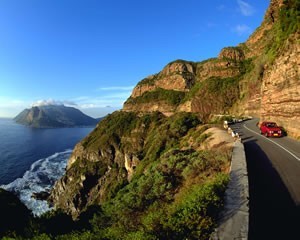 South Africa has been responding to the need for clean energy. Recently a mobile solar school was introduced. Now for the first time ever, a fleet of mass-produced, zero-emission vehicles will take to the streets of Africa. A dozen electric cars from the Renault-Nissan Alliance will highlight the benefits of green transportation and will provide zero-emission* shuttle services for delegates at the 2011 United Nations Climate Change Conference in Durban, South Africa, Nov. 28-Dec. 9. The 17th annual Conference of Parties (better known as COP17) aims to “stabilize greenhouse gas concentrations at a level that will prevent dangerous human interference with the climate system.”
South Africa has been responding to the need for clean energy. Recently a mobile solar school was introduced. Now for the first time ever, a fleet of mass-produced, zero-emission vehicles will take to the streets of Africa. A dozen electric cars from the Renault-Nissan Alliance will highlight the benefits of green transportation and will provide zero-emission* shuttle services for delegates at the 2011 United Nations Climate Change Conference in Durban, South Africa, Nov. 28-Dec. 9. The 17th annual Conference of Parties (better known as COP17) aims to “stabilize greenhouse gas concentrations at a level that will prevent dangerous human interference with the climate system.”
Nissan has already sold more than 20,000 LEAFs on three continents, making it the most popular EV in the world. Renault just began selling Kangoo Z.E., a light commercial vehicle. The Fluence Z.E. family sedan will go on sale shortly followed by Twizy, an urban 2-seater, and ZOE, a compact hatchback, next year. Electric vehicles, which can be charged from purely renewable energy sources such as solar and wind power, will play a critical role in achieving COP17‘s goals and reducing the impact of climate change.
 Solar technology is particularly useful throughout the African continent both in urban and rural areas. In September The SunPower Foundation, announced the donation of high efficiency SunPower photovoltaic (PV) solar panels to Greenpeace Africa. The panels were installed by 30 local youth during a two week solar training course in Durban, South Africa, led by Greenpeace. Students learned more about solar PV and other renewable energy technologies as well as completed course modules covering social entrepreneurship and Greenpeace’s Energy (R)evolution report. The Greenpeace Africa solar powered headquarters will be showcased at the upcoming UN climate talks in Durban.
Solar technology is particularly useful throughout the African continent both in urban and rural areas. In September The SunPower Foundation, announced the donation of high efficiency SunPower photovoltaic (PV) solar panels to Greenpeace Africa. The panels were installed by 30 local youth during a two week solar training course in Durban, South Africa, led by Greenpeace. Students learned more about solar PV and other renewable energy technologies as well as completed course modules covering social entrepreneurship and Greenpeace’s Energy (R)evolution report. The Greenpeace Africa solar powered headquarters will be showcased at the upcoming UN climate talks in Durban.
